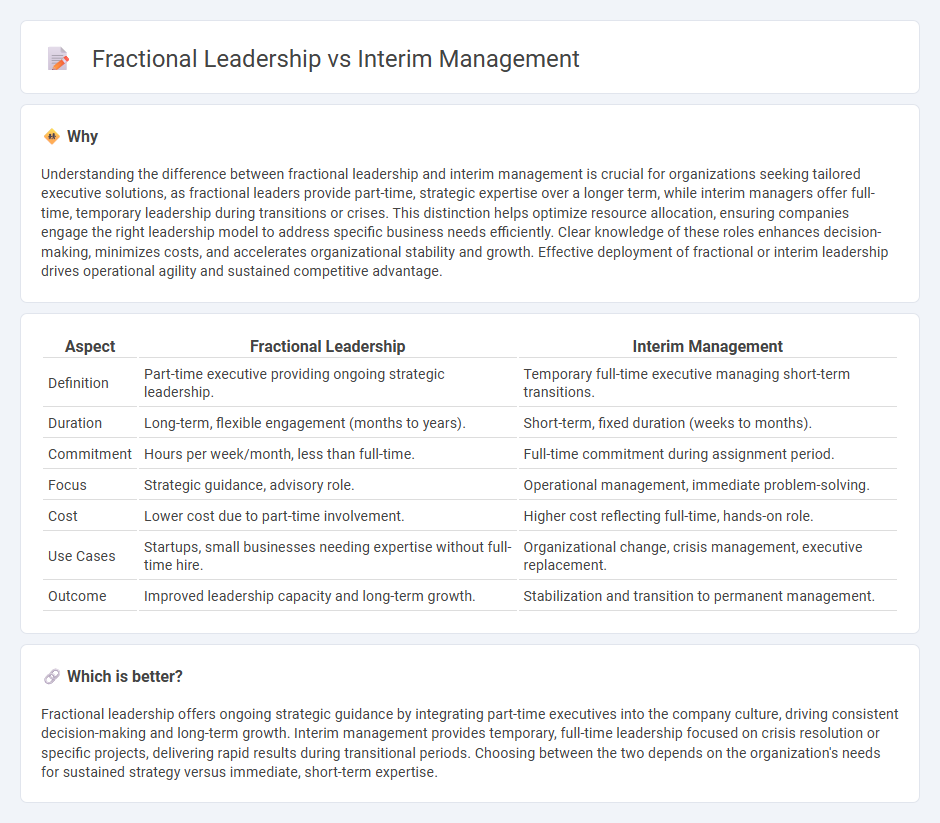
Fractional leadership involves hiring experienced executives on a part-time basis to provide strategic guidance and expertise without the full-time cost, optimizing resource allocation for businesses. Interim management, on the other hand, places a temporary full-time leader in a critical role to address specific challenges or transitions, ensuring continuity and focused problem-solving. Discover how these tailored management solutions can transform your organization's leadership approach.
Why it is important
Understanding the difference between fractional leadership and interim management is crucial for organizations seeking tailored executive solutions, as fractional leaders provide part-time, strategic expertise over a longer term, while interim managers offer full-time, temporary leadership during transitions or crises. This distinction helps optimize resource allocation, ensuring companies engage the right leadership model to address specific business needs efficiently. Clear knowledge of these roles enhances decision-making, minimizes costs, and accelerates organizational stability and growth. Effective deployment of fractional or interim leadership drives operational agility and sustained competitive advantage.
Comparison Table
| Aspect | Fractional Leadership | Interim Management |
|---|---|---|
| Definition | Part-time executive providing ongoing strategic leadership. | Temporary full-time executive managing short-term transitions. |
| Duration | Long-term, flexible engagement (months to years). | Short-term, fixed duration (weeks to months). |
| Commitment | Hours per week/month, less than full-time. | Full-time commitment during assignment period. |
| Focus | Strategic guidance, advisory role. | Operational management, immediate problem-solving. |
| Cost | Lower cost due to part-time involvement. | Higher cost reflecting full-time, hands-on role. |
| Use Cases | Startups, small businesses needing expertise without full-time hire. | Organizational change, crisis management, executive replacement. |
| Outcome | Improved leadership capacity and long-term growth. | Stabilization and transition to permanent management. |
Which is better?
Fractional leadership offers ongoing strategic guidance by integrating part-time executives into the company culture, driving consistent decision-making and long-term growth. Interim management provides temporary, full-time leadership focused on crisis resolution or specific projects, delivering rapid results during transitional periods. Choosing between the two depends on the organization's needs for sustained strategy versus immediate, short-term expertise.
Connection
Fractional leadership and interim management provide flexible executive solutions by assigning experienced leaders to organizations on a temporary or part-time basis, addressing critical gaps in leadership without long-term commitments. Both approaches enable companies to access specialized skills and strategic guidance during periods of transition, growth, or restructuring. This connection supports agility in management while optimizing costs and maintaining business continuity.
Key Terms
**Interim Management:**
Interim management provides organizations with temporary executive expertise to lead through periods of change, crisis, or transition, delivering immediate results without long-term commitment. It is ideal for filling leadership gaps swiftly or managing critical projects where specialized skills are required on a short-term basis. Discover more about how interim management can drive strategic agility and operational continuity in your business.
Temporary Executive Placement
Interim management provides businesses with short-term executive placement during critical transitions, leveraging experienced leaders to maintain operational stability and drive urgent projects. Fractional leadership offers part-time expertise, allowing companies to benefit from specialized skills without committing to full-time roles, optimizing cost efficiency and strategic input. Discover how choosing between interim management and fractional leadership can transform your executive approach.
Crisis Resolution
Interim management and fractional leadership both provide strategic leadership during critical periods, but interim management offers full-time, short-term solutions for immediate crisis resolution, while fractional leadership delivers part-time expertise ideal for ongoing guidance and stability. Interim managers often step in to directly manage teams and projects during business disruptions, ensuring rapid decision-making and operational continuity. Explore more to understand how each approach can stabilize your organization effectively.
Source and External Links
What is Interim Management - Interim management involves employing highly experienced executives on a temporary basis to address specific business problems or crises.
Interim Management - Boyden - Boyden's interim management solutions help organizations navigate transitions and crises by providing temporary leadership with specialized skills.
Interim management - Wikipedia - Interim management is the temporary provision of management resources and skills to handle organizational transitions, crises, or change.
 dowidth.com
dowidth.com